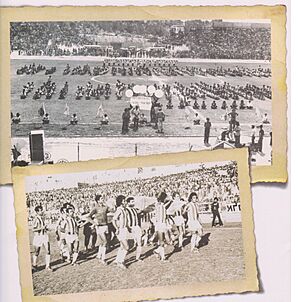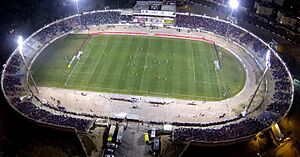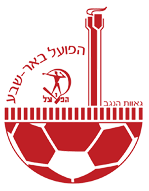Hapoel Be'er Sheva F.C. facts for kids
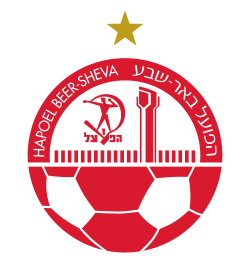 |
||||
| Full name | Hapoel Be'er Sheva Football Club | |||
|---|---|---|---|---|
| Nickname(s) | The Camels The Reds from the South |
|||
| Short name | HBS | |||
| Founded | 1 May 1949 | |||
| Ground | Turner Stadium, Be'er Sheva | |||
| Capacity | 16,126 | |||
| Owner | Alona Barkat | |||
| Chairman | Guy Primor | |||
| Manager | Ran Kojok | |||
| League | Israeli Premier League | |||
| 2021–22 | Israeli Premier League, 2nd of 14 | |||
|
||||
Hapoel Be'er Sheva Football Club (Hebrew: מועדון הכדורגל הפועל באר שבע) is a professional football team from Be'er Sheva, Israel. They play in the top Israeli league, the Israeli Premier League. The club started in 1949. Since 2007, a businesswoman named Alona Barkat has owned and managed the club. Hapoel Be'er Sheva also has youth teams and a women's team, plus a football academy for young players.
The team's home uniform colors are red and white. They used to play in an old stadium in Be'er Sheva until 1959. In 1960, they moved to Vasermil Stadium. Since the 2015–16 season, their home ground is the Turner Stadium.
Hapoel Be'er Sheva started winning major titles in the 1970s. Over the years, they have won five league championships, four State Cups, four Toto Cups, and four Super Cups. They were one of the first Israeli teams to play in a European competition. They were also the first Israeli team to play in the UEFA Cup.
Contents
Team History
Early Days and Growth
The team began in 1949. Zalman Caspi, a footballer, helped find young players in the Be'er Sheva area to form a team. In April 1950, the club officially started as part of the Hapoel sports group.
Hapoel Be'er Sheva played their first game on May 1, 1950, winning 5–4 against Hapoel Mefalsim. The club's official activities were paused in 1952 due to travel distances. But in 1954, they rejoined the league in the Negev region.
In the 1955–56 season, coached by Yosef Azran, they finished first in their division. This helped them move up to Liga Bet, which was the second division at the time. In the 1958–59 season, they moved up again to Liga Alef, the second-highest league. This happened after a key win against Hapoel Netanya.
Moving Up to the Top League
In the 1959–60 season, Hapoel Be'er Sheva started playing at the municipal stadium. They also played their first international friendly game against Anorthosis Famagusta from Cyprus.
The team reached the semi-finals of the State Cup for the first time in the 1961–62 season. In the 1964–65 season, under coach Slavko Milošević, Hapoel Be'er Sheva finished first in their league. This meant they were promoted to the Liga Leumit, which was the top league in Israel at the time. This was a big moment for the club. Key players like Eliyahu Offer and Abraham Noma helped them achieve this.
First Championships
The 1974–75 season was historic. Amazia Levkovich became the coach and brought in a new attacking style. He used young players like Uri Benjamin and Jacob Cohen. The team won the Liga Leumit championship for the first time ever. Most of the players were from the local area. Uri Benjamin was even named Footballer of the Year in Israel.
In the summer of 1975, the team won the Super Cup for the first time. They beat Hapoel Kfar Saba 2–1.
In the 1975–76 season, Hapoel Be'er Sheva won their second championship in a row. They fought hard against Beitar Jerusalem. This made them one of the strongest teams in Israel.
In the summer of 1976, Hapoel Be'er Sheva and Beitar Jerusalem were the first Israeli teams to play in the UEFA Intertoto Cup. This was their first time playing in a European competition.
Challenges and Comebacks
The late 1970s and 1980s saw the team face some challenges. They sometimes struggled in the league but also had good moments. In the 1981–82 season, they finished fourth in the league. They also reached the semi-finals of the State Cup.
In 1988, they won the Lilian Cup for the third time. In the 1988–89 season, they won the Toto Cup for the first time.
The 1990s brought new changes, including foreign players joining the Israeli league. Hapoel Be'er Sheva continued to have ups and downs. In the 1993–94 season, they finished third in the league. This earned them a spot in the UEFA Cup for the first time.
In the 1995–96 Liga Leumit season, they played against FC Barcelona in the UEFA Cup. They lost both games but it was a big experience for the club. They also won the Toto Cup for the second time that season.
A major achievement came in the 1996–97 season. Under coach Eli Guttman, the team won their first State Cup by beating Maccabi Tel Aviv 1–0.
However, in the 1997–98 season, many key players left. Despite a great effort by young player Yossi Benayoun, the team was relegated to the second division after 27 years in the top league.
Return to the Top League
Hapoel Be'er Sheva spent a few years in the second division. In the 2000–01 season, they finally returned to the Premier League. They finished first in their league to earn promotion.
In the 2002–03 season, they reached the State Cup final again but lost. In the 2003–04 season, they finished fourth, which gave them a spot in the UEFA Intertoto Cup.
The team faced financial problems in the 2004–05 season and were relegated again.
The Alona Barkat Era
In July 2007, businesswoman Alona Barkat bought the team. This marked a new beginning for the club. Sadly, in August 2007, player Chaswe Nsofwa passed away during a training match.
In the 2008–09 season, Hapoel Be'er Sheva returned to the Premier League after four years. They also won the Toto Cup for the second division that season.
The team continued to grow under Alona Barkat's leadership. In the 2013–14 season, they finished second in the league. This was their best finish since their championship years and earned them a spot in the UEFA Europa League preliminaries.
In the 2014–15 season, they played in European competitions again after 18 years. They reached the State Cup final but lost to Maccabi Tel Aviv.
Recent Successes
In the 2015–16 season, Barak Bakhar became the new coach. The team opened the new Turner Stadium in September 2015. On May 21, 2016, Hapoel Be'er Sheva won their third league championship. This was their first championship in 40 years! They had an amazing season, going 29 games without a loss.
The 2016–17 season was also very successful. They won the Super Cup and reached the playoffs of the UEFA Champions League qualification. They then played in the UEFA Europa League group stage. They even beat Inter Milan twice and made it past the group stage for the first time ever. They also won the Toto Cup again. On April 29, 2017, they won their second consecutive championship.
In the 2017–18 season, they won the Super Cup again. They also reached the playoff stage of the UEFA Champions League qualification. At the end of the season, they won their fifth league championship, making it three in a row!
More recently, Hapoel Be'er Sheva won the State Cup in the 2019–20 season. They won it again in the 2021–22 season after a penalty shootout.
Stadium and Facilities
Hapoel Be'er Sheva has played in three different stadiums since 1949. They started in the old city stadium.
In 1959, the municipal stadium was built. It was named after Arthur Vasermil, a boy who was murdered in the Holocaust. The stadium was renovated in 1995 and again in 2009. The last game at Vasermil Stadium was on May 30, 2015.
On September 16, 2015, the new Turner Stadium opened. It can hold 16,126 fans. The first game there was on September 21, 2015, against Maccabi Haifa.
Vasermil Training Ground
The Be'er Sheva Municipality decided to honor the old Vasermil Stadium by naming a training ground after it. This area is mainly used by Hapoel Be'er Sheva's youth teams. It has five training fields, including one with artificial turf. In 2013, a new building was opened with computer rooms, locker rooms, and other modern facilities for the club.
Fans
Hapoel Be'er Sheva has one of the largest fan bases in Israel. Their fans are known for being very supportive. In the 2012–13 season, they even won an award for being the year's fairest audience.
UltraSouth Fan Group
UltraSouth is a main fan group that started in 2014. They are known for their loud support and for creating amazing displays at games. They help organize fans and create large flags and signs to make the stands look great. UltraSouth focuses on supporting the team and avoids political messages. They also communicate with fans through social media.
Team Crest
The club's crest (logo) has changed a few times over the years. When the club first started, their crest simply said "Hapoel Be'er Sheva." This logo was used until 1993.
In 1993, the club changed its crest. Because the team was nicknamed "The Camels," the new crest included a camel hump. It also had a soccer ball and the team's name in Hebrew and English.
From 1995 to 2016, the crest showed half a soccer ball at the bottom. The top half had a chimney, which represents the city's building. It also had the words "the pride of the Negev," showing that the team is from the capital of the Negev region.
On June 21, 2016, the club showed its current official emblem. It is similar to the 1995-2016 crest. It has half a soccer ball, the chimney symbol, and the club's name in Hebrew and English. A star is also displayed below the crest. This star shows that the club has won five championships.
Team Uniforms and Sponsors
Uniforms
Hapoel Be'er Sheva's home uniforms have always been red and white. Their third uniform is blue. Sometimes, they have also used black. In the 1990s, they even wore purple uniforms because of a sponsor. Their most famous uniforms are the red and white striped shirts from their first two championship seasons.
Since the 2019–20 season, their uniforms have been made by the Kelme company. Over the years, many different companies have made their uniforms, including Kappa, Adidas, Nike, Diadora, Lotto, Puma, and Umbro.
Here are the uniform manufacturers since 1975:
| Period | Kit manufacturer |
|---|---|
| 1975–1980 | Umbro |
| 1980–1983 | Adidas |
| 1983–1986 | Umbro |
| 1986–1995 | Diadora |
| 1995–1998 | Lotto |
| 1998–2000 | Diadora |
| 2000–2004 | Kappa |
| 2004–2005 | Nike |
| 2005–2008 | Lotto |
| 2008–2011 | Diadora |
| 2011–2016 | Kappa |
| 2016–2019 | Puma |
| 2019–2023 | Kelme |
| 2023–present | Umbro |
Sponsors
Hapoel Be'er Sheva has worked with many sponsors over the years. Some well-known past sponsors include Solel Boneh and the car company Kia.
As of 2025, the main sponsor is Mahsanei HaShuk. Other sponsors include Metropoline, Fattal Hotels, Kelme, and Eurotec group.
Here are the main sponsors since 2012:
| Period | Shirt sponsor |
|---|---|
| 2012–2015 | O-Mobli |
| 2015–2016 | Get Stocks |
| 2016–2020 | Tadiran |
| 2020–2022 | Mahsanei HaShuk |
| 2022–present | Victory |
Achievements and Records
Honours
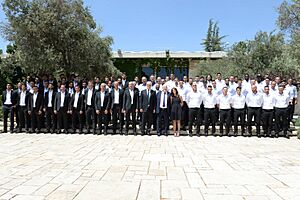
Hapoel Be'er Sheva has won many important titles:
- Premier League:
- Winners (5): 1974–75, 1975–76, 2015–16, 2016–17, 2017–18
- Runners-up (4): 2013–14, 2021–22, 2022–23, 2024–25
- Second League:
- Winners (3): 1964–65, 1970–71, 2000–01
- State Cup:
- Winners (4): 1996–97, 2019–20, 2021–22, 2024–25
- Runners-up (4): 1983–84, 2002–03, 2014–15, 2023–24
- Super Cup:
- Winners (5): 1975, 2016, 2017, 2022, 2025
- Runners-up (3): 1976, 2018, 2020
- Toto Cup:
- Winners (3): 1988–89, 1995–96, 2016–17
Team Records
- Seasons in top division: 51 (including the 2024–25 season)
- First Israeli team to play in a European competition (1976–77).
- Longest undefeated streak in the league: 29 games (from October 3, 2015, to May 9, 2016).
- Longest home games without a loss: 51 games (from September 21, 2015, to May 12, 2018).
- Most wins in a season: 26 (2016–17).
- Most goals scored in a season: 73 (2016–17).
- Fewest goals conceded in a season: 18 (2016–17).
Player Records
- Most league appearances: Shlomo Iluz, with 515 games.
- Top league scorer: Shalom Avitan, with 100 goals.
- Most goals in a single season: Hisham Zuabi, 17 goals in the 1992–93 season.
- Most assists in a single season: Maor Buzaglo (2013–14) and Maor Melikson (2015–16), both with 14 assists.
Most Appearances
| # | Name | Games | Period |
|---|---|---|---|
| 1 | Shlomo Iluz | 515 | 1977–1996 |
| 2 | Eliyahu Offer | 450 | 1959–1978 |
| 3 | Stav Elimelech | 431 | 1987–1997, 1998–2005 |
| 4 | Rafi Eliyahu | 419 | 1966–1984 |
| 5 | Meir Barad | 344 | 1966–1977, 1978–1982 |
Most League Goals
| # | Name | Goals | Period |
|---|---|---|---|
| 1 | Shalom Avitan | 100 | 1972–1973, 1975–1980, 1981–1985 |
| 2 | Meir Barad | 80 | 1966–1977, 1978–1982 |
| 3 | Rafi Eliyahu | 66 | 1966–1984 |
| 4 | Eliyahu Offer | 64 | 2059–2076 |
| 5 | Avraham Numa | 64 | 1964–1978 |
Top Scorers of the Premier League
- Players who won the top scorer title:
| Season | Name | Goals | Notes |
|---|---|---|---|
| 2003–04 | Ofir Haim | 16 | Shared with Shay Holtzman from Ashdod |
| 2018–19 | Ben Sahar | 15 | – |
Footballer of the Season Award Winners
- Players from Hapoel Be'er Sheva who won the Israeli Premier League Footballer of the Season award:
| Season | Name | Group titles | Notes |
|---|---|---|---|
| 1966–68 | Avraham Numa | – | Maariv newspaper footballer of the year |
| 1974–75 | Uri Benjamin | Championship | – |
| 2015–16 | Elyaniv Barda | Championship | "Leagues Manager" and "ONE" footballer of the year |
| 2016–17 | Miguel Vítor | Championship, Super Cup and Toto Cup | "Leagues Manager" footballer of the year |
| 2017–18 | Hanan Maman | Championship | "Leagues Manager" footballer of the year |
Hapoel Be'er Sheva in Europe
Hapoel Be'er Sheva F.C. in European football
Players
Current Squad
|
|
Other Players Under Contract
|
Players on Loan
|
|
Retired Numbers
|
Foreign Players for 2025–26 Season
Israeli clubs can have up to six non-Israeli players in their squad, but only five can play at the same time. Some players who have played in Israel for a long time can get special status to play as if they were Israeli citizens.
Professional Staff
| Position | Staff |
|---|---|
| Manager | |
| Assistant manager | |
| Goalkeeping coach | |
| Fitness coach |
- Last updated: July 23, 2025
Coaches
| To hide click on → | ||||||||||||||||||||||||||||||||||||||||||||||||
|---|---|---|---|---|---|---|---|---|---|---|---|---|---|---|---|---|---|---|---|---|---|---|---|---|---|---|---|---|---|---|---|---|---|---|---|---|---|---|---|---|---|---|---|---|---|---|---|---|
|
|
|||||||||||||||||||||||||||||||||||||||||||||||
Youth Department
Hapoel "Hashlosha" Be'er Sheva has one of the largest youth football departments in Israel. For many years, the club has had strong youth teams.
In 1969, Hapoel Be'er Sheva's youth team won the first Israeli Youth Championship. Later, another youth group called Hapoel "Hashlosha" was formed. This group was named after three factory workers who died in an accident. "Hashlosha" became a top youth team and won four State Youth Championships.
From the mid-1960s, the youth teams found talented players from local youth leagues. However, when the club became privately owned in the 1990s, less money was put into the youth department. This caused the youth teams to drop in rank.
Since Alona Barkat bought the club in 2007, a lot of money has been invested in the youth departments. This has helped the youth teams return to being among the best in the youth league.
Youth Department Teams
The professional director of the Youth Department is Shmulik Hanin.
Youth Honours
- Youth Israeli champions:
- Winners (4): 1969–70, 1973–74, 1975–76, 1984–85
- Youth Super Cup:
- Winners (1): 1984–85
See also
 In Spanish: Hapoel Be'er Sheva para niños
In Spanish: Hapoel Be'er Sheva para niños
 | Kyle Baker |
 | Joseph Yoakum |
 | Laura Wheeler Waring |
 | Henry Ossawa Tanner |


